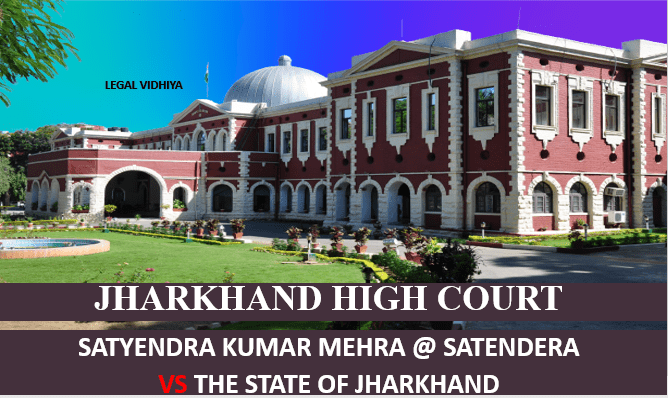
SATYENDRA KUMAR MEHRA @ SATENDERA… VS THE STATE OF JHARKHAND ON 23 MARCH, 2018
CITATION | |
DATE OF JUDGEMENT | 23 MARCH 2018 |
COURT | JHARKHAND HIGH COURT |
APPELLATE | STYENDRA KUMAR MEHRA @SATENDERA |
RESPONDENT | STATE OF JHARKHAND |
BENCH | JUSTICE ASHOK BHUSHAN , A SIKRI |
| REFERRED | U/s 120B/420, 120B/467, 120B/468 and 120B/471 IPC |
CASE ANALYSIS –
BACKGROUND OF THE CASE –
The case of Satyendra Kumar Mehra @ Satendera vs The State of
Jharkhand was related to the grant of bail to an accused under the Prevention of Corruption Act, 1988. The argument presented in the court was that the accused was entitled to bail as there was no evidence of corruption against him and he had already been in custody for a considerable period of time.
The court held that the grant of bail is a discretionary power of the courts and should be exercised judiciously. The court also held that the accused cannot be granted bail merely on the ground that he has been in custody for a long period of time and that the gravity of the offence and the likelihood of the accused tampering with evidence should also be taken into consideration.
Therefore, the court denied bail to the accused as it found that there was a likelihood of him tampering with evidence and that the offence was of a
serious nature. The judgment reamrms the principle that the grant of bail is a discretionary power and should be exercised judiciously taking into consideration all relevant factors.
facts of the case –
The case involved an accused named Satyendra Kumar Mehra, also known as Satendera, who was charged under the Prevention of Corruption Act, 1988. The allegation against him was that he had demanded a bribe from a contractor for awarding a contract for construction work.
Satendera was arrested on 22nd July 2016 and had been in custody since then.
He had applied for bail several times, but his applications were rejected by the lower courts. He then approached the Jharkhand High Court for bail.The appellant was an accused in R.C. Case No.68(A) of1996-
State (through CBI) vs. Lalu Prasad @ Lalu Prasad Yadav and others. Accused
were tried for the offence punishable Under Sections 120- B/ read with 409, 420, 467, 468, 471 and
477A of the IPC read with Section 13(1)
(c) & (d) and 13(2) ofPrevention of Corruption Act, 1988 The trial court by Order dated 24.01.2018 convicted the accused and awarded sentence. The Jharkhand High Court considered all the arguments presented by both sides and held that the grant of bail is a discretionary power of the courts. It also held that the accused cannot be granted bail merely on the ground of long custody and that the gravity of the offence and the likelihood of tampering with evidence should also be taken into consideration.
ISSUE ARISES IN THE CASE –
The issue in this case was whether Satendera should be granted bail or not, considering the allegations of corruption against him and the likelihood of him tampering with evidence if released on bail.
ARGUMENTS
The defense argued that there was no evidence of corruption against
Satendera and that he had been falsely implicated in the case. They also
argued that he had been in custody for a long time and was entitled to bail. The prosecution argued that Satendera was a government omcial and there was a likelihood of him tampering with evidence if released on bail,
and that the offence was of a serious nature and bail should not be
granted. The court held that the grant of bail is a discretionary power of the courts, and that the accused cannot be granted bail merely on the ground of long custody. The court found that there was a likelihood of
Satendera tampered with evidence if he was released on bail and that the offence was of a serious nature, and therefore denied bail to Satendera.
The Jharkhand High Court considered all the arguments presented by both sides and held that the grant of bail is a discretionary power of the courts. The court also held that the accused cannot be granted bail merely on the ground of long custody and that the gravity of the offence and the likelihood of tampering with evidence should also be taken into consideration.
The court found that there was a likelihood of Satendera tampering with evidence if he was released on bail and that the offence was of a serious nature. Therefore, it denied bail to Satendera.
JUDGEMENT –
Overall, the decision of the court was based on the seriousness of the offence and the likelihood of tampering with evidence, rather than the length of custody or lack of evidence against Satendera. This case highlights the importance of considering all relevant factors when deciding whether to grant bail to an accused person.
the fact that Satendera had previously been convicted of a similar offence.
Despite the lack of direct evidence against him, the court denied Satendera’s bail application, citing the gravity of the offence and the potential harm to society if he were released. This decision underscores the importance of considering all relevant factors when deciding whether to grant bail to an accused person, and highlights the need for caution in cases involving serious offences.
Http:/indiankanoon.org.
“This article is written by Vidhi Bharti student of Shri Ramswaroop Memorial university (3rd year) under intern at Legal Vidya “




0 Comments